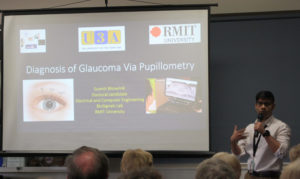The last of the monthly morning teas started off as a noisy affair and soon Glen Wall, the president calmed everyone down. There were lots to mention before the year ended
Two new policies were uploaded onto the website and were discussed; selling of goods and raffles.
It is good practice for all organisations to have a Code of Conduct that their members subscribe to and Whittlesea U3A has a Code of Conduct which all members on joining or renewing membership agree to abide by. The City of Whittlesea last year required all registered clubs to have a Members Code of Conduct and provide a copy with the Council to be considered for Council funding. We also have a Policy on Bullying.
Whittlesea U3Amembership is growing significantly in both numbers and diversity; we now have 855 and more people are making enquiries, it is important for the Committee of Management to ensure that we as an organisation comply with Victorian State and Local Government Regulations.
As stated in the Competition section of the website that there would be 3 members chosen this month; 4016, 11103, and 18058, but unfortunately these people were not present at the morning tea, therefore, 3 numbers had to be picked out from the attendance book. Julie Parry, Val Marlow, and Tin Chuah received the Whittlesea U3A logo cups.
It is very important to understand the process of enrolments and Kevin Whelan the ‘Membership Management’ person stepped up and gave a PowerPoint demonstration. Remember, your member number will not change and look carefully through the Course List Summary for the courses you are interested in. Enrolments open on Thursday 5th December at 10.00 am, no earlier.
Glen introduced the guest speaker, Susmit Bhowmik a Ph.D. student from the Glaucoma Research RMIT Collaboration and Importance of participating in studies. He was asking for volunteers to help him with his research. The PowerPoint presentation was very interesting and members asked questions after.

Glaucoma refers to a group of eye conditions that lead to damage to the optic nerve, the nerve that carries visual information from the eye to the brain. In many cases, damage to the optic nerve is due to increased pressure in the eye, also known as intraocular pressure. Glaucoma is the leading cause of irreversible blindness in the world. Glaucoma usually causes no symptoms early in its course, at which time it can only be diagnosed by regular eye examinations and screenings with the frequency of examination based on age and the presence of other risk factors. Glaucoma is usually treated with eye drops, although lasers and surgery can also be used. Most cases can be controlled well with these treatments, thereby preventing further loss of vision. Much research into the causes and treatment of glaucoma is being carried out throughout the world. Early diagnosis and treatment is the key to preserving sight in people with glaucoma.
If you would like to partake in these studies please contact the RMIT research team.
